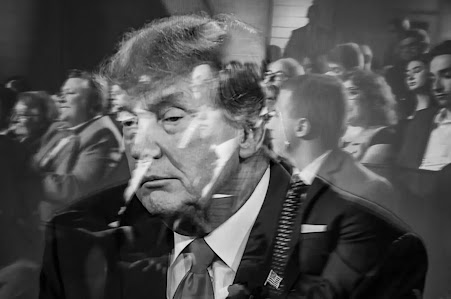In an August 7, 2023, column in The New York Times, Steven Brill says that "the only issue that Americans on all sides of our vast political divide seem to agree on is that we cannot agree on anything. Even basic facts have become matters of opinion."
This rings true to me. The Times identifies Brill (who is a lawyer, as well as a journalist) as "the founder of Court TV, a co-chief executive of NewsGuard and the author of the forthcoming The Death of Truth.” You can click the following link to read the entire column (paywall policies permitting). Brill's opinion essay is titled, "Americans Will Believe the Trump Verdict Only if They Can See It." Again, that statement rings pretty true to me. Getting the court proceedings televised, however, as Brill outlines, will not be an easy task. In addition, there are some compelling arguments to the contrary, including those presented in a New York Times' Guest Esssy on "Why Televising The Trump Trials Is A Bad Idea," written by former Watergate prosecutor Nick Akerman.
What actually struck me most in the Brill column was not his observations on the desirability of televising the Trump trial (or trials). Here are the words that most directly captured my attention, with emphasis added:
In the work I do looking at the reliability of online news and information, I can see that the erosion of trust in basic facts is largely the result of too many people getting their news from social media platforms. What they see there may be highly opinionated, one-sided, boiled down to a few words or catchy phrases or taken out of context or come from people with undisclosed credentials or agendas or be just plain made up. And it’s all sorted out and presented by algorithms designed to engage people to spend more time on the platform by offering up content that will excite rather than inform and please them rather than challenge them, by reinforcing what they already believe.
What’s presented to jurors in a courtroom has the opposite qualities. Court is a quiet, somber sanctuary, where rules prevent the disorienting chaos we experience online. Jurors are made aware of the credentials and possible biases of witnesses. Documents and other exhibits are painstakingly authenticated. The admissibility of evidence is carefully vetted by a judge, and after a lawyer on one side is allowed to present it, a lawyer on the other side can then challenge it, with both lawyers strictly limited by rules not allowing them to present hearsay or rumors or offer their opinions.
In the 1980s, as a journalist reporting on the law, I interviewed jurors after their trials to find out how they had reached their verdicts. After a while, one thing struck me as unusually consistent: Jurors said that after sitting on juries, they were surprised by how much more favorably they thought of our justice system. When they got to see the system up close and at full length — instead of how it was displayed on the 11 o’clock news (this was well before we all went online), with sound-bite spins from lawyers on the courthouse steps or prosecutors at a news conference — they decided that it worked well. That it did a good job sorting out the truth. More than one juror told me that it was something we should all be proud of.
One of the most famous trials ever conducted ended with the judge washing his hands and posing this question: "What is Truth?" Pontius Pilate's question really does suggest the idea that "truth," in the end, is really just a matter of "opinion."
But that is not, actually, correct! We can make mistakes as we attempt to discern and define "truth," but there is such a thing! There is such a thing as "truth," and our justice system should be structured in a way that allows "truth," not "opinion," to determine what is decided, and what verdicts are rendered - at least to the greatest degree possible.
The jury system is a pretty good system, as Steven Brill reminds us. The upcoming trial (or trials) of our former president - televised or not - will give us an opportunity to recapture our belief that decisions about guilt or innocence should be based on the "truth," not "assertions" and "opinions."
Image Credits:
(2) - https://medium.com/@stowens/pontius-pilate-on-trial-eeebdb82ecb6



No comments:
Post a Comment
Thanks for your comment!